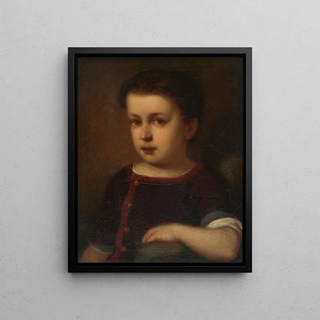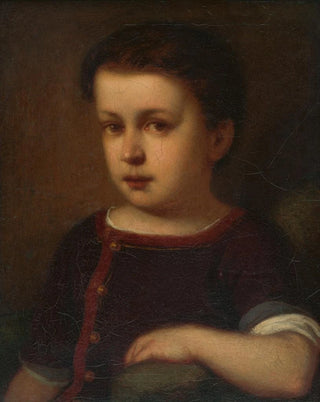Art print | Portrait of a Child - Gyula Benczúr


View from behind

Frame (optional)
In the vast panorama of art history, certain works stand out for their ability to capture the innocence and purity of childhood. "Portrait of a Child - Gyula Benczúr" is one of those creations that transports us into a universe filled with tenderness and delicacy. This painting, created by the Hungarian master Gyula Benczúr, evokes not only the beauty of a juvenile face but also the deep emotion that emanates from every brushstroke. The piece, both intimate and universal, invites us to reflect on the passage of time and the fragility of childhood, themes that resonate across ages.
Style and uniqueness of the work
Benczúr's style is characterized by striking realism, combined with an exceptional mastery of light and color. In "Portrait of a Child," every detail is carefully crafted, from the reflections in the eyes to the nuances of the skin. The artist manages to create a warm, almost tangible atmosphere, where the lively presence of the child is felt. The composition, though simple in appearance, reveals an emotional depth that captures the viewer's attention. The chromatic choices, subtle and harmonious, demonstrate a rare sensitivity, while the blurred background highlights the main subject, thus emphasizing the innocence and vulnerability of childhood. This work, through its singularity, establishes itself as a true masterpiece that transcends time and styles.
The artist and his influence
Gyula Benczúr, an emblematic figure of 19th-century Hungarian art, knew how to mark his era with a unique style that combines tradition and innovation. Trained at the Vienna Academy of Fine Arts, he was influenced by the great masters of the past while developing a personal and contemporary approach. His work reflects a time when art was perceived as a means of deep expression of human emotions. Benczúr managed to establish himself on the international art scene thanks to his ability to depict daily life with rare emotional intensity. His influence is still felt today,

Matte finish

View from behind

Frame (optional)
In the vast panorama of art history, certain works stand out for their ability to capture the innocence and purity of childhood. "Portrait of a Child - Gyula Benczúr" is one of those creations that transports us into a universe filled with tenderness and delicacy. This painting, created by the Hungarian master Gyula Benczúr, evokes not only the beauty of a juvenile face but also the deep emotion that emanates from every brushstroke. The piece, both intimate and universal, invites us to reflect on the passage of time and the fragility of childhood, themes that resonate across ages.
Style and uniqueness of the work
Benczúr's style is characterized by striking realism, combined with an exceptional mastery of light and color. In "Portrait of a Child," every detail is carefully crafted, from the reflections in the eyes to the nuances of the skin. The artist manages to create a warm, almost tangible atmosphere, where the lively presence of the child is felt. The composition, though simple in appearance, reveals an emotional depth that captures the viewer's attention. The chromatic choices, subtle and harmonious, demonstrate a rare sensitivity, while the blurred background highlights the main subject, thus emphasizing the innocence and vulnerability of childhood. This work, through its singularity, establishes itself as a true masterpiece that transcends time and styles.
The artist and his influence
Gyula Benczúr, an emblematic figure of 19th-century Hungarian art, knew how to mark his era with a unique style that combines tradition and innovation. Trained at the Vienna Academy of Fine Arts, he was influenced by the great masters of the past while developing a personal and contemporary approach. His work reflects a time when art was perceived as a means of deep expression of human emotions. Benczúr managed to establish himself on the international art scene thanks to his ability to depict daily life with rare emotional intensity. His influence is still felt today,






